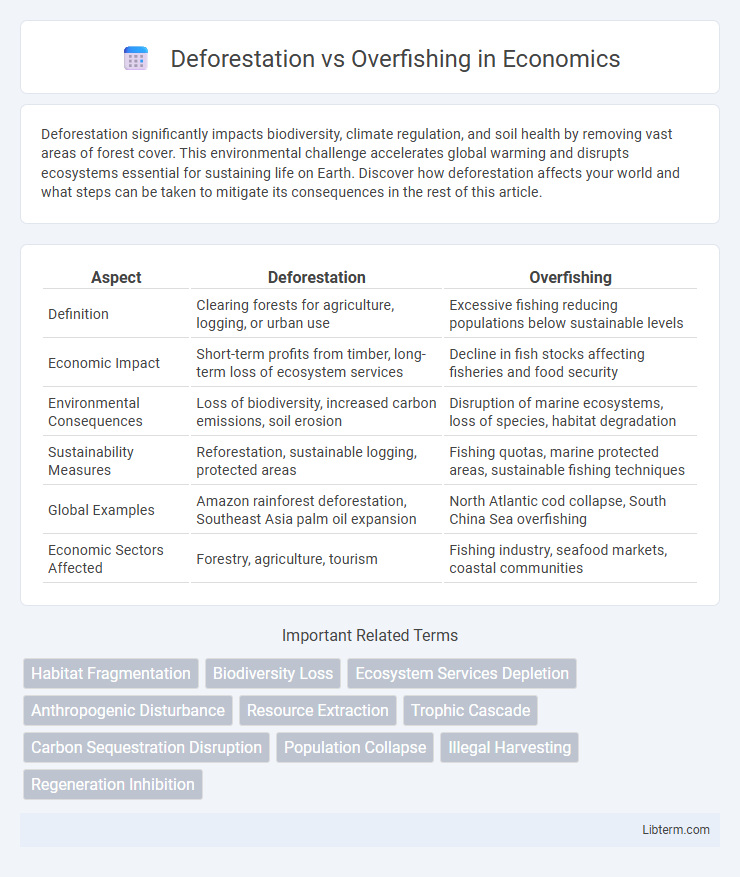Deforestation significantly impacts biodiversity, climate regulation, and soil health by removing vast areas of forest cover. This environmental challenge accelerates global warming and disrupts ecosystems essential for sustaining life on Earth. Discover how deforestation affects your world and what steps can be taken to mitigate its consequences in the rest of this article.
Table of Comparison
| Aspect | Deforestation | Overfishing |
|---|---|---|
| Definition | Clearing forests for agriculture, logging, or urban use | Excessive fishing reducing populations below sustainable levels |
| Economic Impact | Short-term profits from timber, long-term loss of ecosystem services | Decline in fish stocks affecting fisheries and food security |
| Environmental Consequences | Loss of biodiversity, increased carbon emissions, soil erosion | Disruption of marine ecosystems, loss of species, habitat degradation |
| Sustainability Measures | Reforestation, sustainable logging, protected areas | Fishing quotas, marine protected areas, sustainable fishing techniques |
| Global Examples | Amazon rainforest deforestation, Southeast Asia palm oil expansion | North Atlantic cod collapse, South China Sea overfishing |
| Economic Sectors Affected | Forestry, agriculture, tourism | Fishing industry, seafood markets, coastal communities |
Introduction: Comparing Deforestation and Overfishing
Deforestation involves the large-scale removal of forests, leading to habitat loss, reduced biodiversity, and increased carbon emissions, while overfishing depletes marine populations, disrupts aquatic ecosystems, and threatens food security. Both environmental challenges significantly impact ecological balance, with deforestation primarily affecting terrestrial ecosystems and overfishing targeting marine life. Addressing these issues requires sustainable resource management to preserve biodiversity and maintain ecosystem services.
Causes of Deforestation
Deforestation primarily results from agricultural expansion, logging, and infrastructure development, driven by increasing global demand for timber, paper, and arable land. Illegal logging and slash-and-burn practices significantly accelerate forest loss, particularly in tropical regions such as the Amazon, Congo Basin, and Southeast Asia. The clearing of forests disrupts biodiversity, affects carbon sequestration, and contributes to climate change more severely than overfishing impacts marine ecosystems.
Root Causes of Overfishing
Overfishing is primarily driven by increased global demand for seafood, poor fisheries management, and technological advancements that enable the capture of large fish quantities. Illegal, unreported, and unregulated (IUU) fishing exacerbates population declines, disrupting marine ecosystems and biodiversity. Economic pressures on fishing communities and inadequate regulatory enforcement also contribute significantly to the depletion of fish stocks.
Environmental Impacts of Deforestation
Deforestation leads to severe environmental impacts such as loss of biodiversity, disruption of water cycles, and increased carbon emissions contributing to climate change. The removal of trees reduces habitat for countless species, destabilizes soil, and diminishes natural carbon sinks, exacerbating global warming. Unlike overfishing, which primarily affects marine ecosystems, deforestation has a broader impact on terrestrial ecosystems and atmospheric conditions.
Ecological Consequences of Overfishing
Overfishing disrupts marine ecosystems by depleting key fish populations, leading to imbalanced food webs and loss of biodiversity. The reduction of predatory species causes population explosions of smaller organisms, altering nutrient cycles and damaging coral reefs. This ecological imbalance threatens commercial fisheries, coastal communities, and global marine health.
Effects on Biodiversity: Forests vs Oceans
Deforestation causes habitat loss and fragmentation, severely reducing biodiversity by displacing countless terrestrial species and disrupting ecosystems within forests. Overfishing leads to the depletion of key marine species, altering food webs and causing declines in oceanic biodiversity by removing predator or prey species critical for ecosystem balance. Both issues contribute to ecosystem degradation, but deforestation predominantly affects land-based biodiversity, while overfishing critically impacts marine life diversity and ocean health.
Climate Change Implications: Land vs Sea
Deforestation accelerates climate change by releasing stored carbon dioxide from trees, which disrupts terrestrial ecosystems and reduces biodiversity on land. Overfishing affects oceanic carbon cycles by altering marine food webs and diminishing the ocean's capacity to sequester carbon dioxide, impacting global climate regulation. Both processes contribute differently to climate change: deforestation intensifies atmospheric greenhouse gases, while overfishing weakens marine carbon sinks essential for mitigating global warming.
Socioeconomic Impact on Local Communities
Deforestation causes displacement of indigenous populations and disrupts traditional livelihoods dependent on forest resources, leading to increased poverty and food insecurity. Overfishing depletes marine biodiversity, undermining the economic stability of coastal communities reliant on fishing for income and nutrition. Both practices contribute to social inequality by exacerbating resource scarcity and limiting sustainable development opportunities.
Global Solutions: Combating Deforestation and Overfishing
Global solutions for combating deforestation and overfishing emphasize sustainable resource management through enforcing stricter regulations, promoting reforestation programs, and establishing marine protected areas that help restore biodiversity. Innovative technologies like satellite monitoring and AI-driven analytics enhance tracking illegal logging and overfishing activities, enabling governments and NGOs to implement timely interventions. International cooperation through agreements such as the Paris Agreement and the United Nations Sustainable Development Goals (SDGs) play critical roles in aligning policies, funding conservation efforts, and supporting community-based initiatives.
Conclusion: Balancing Conservation Efforts
Balancing conservation efforts between deforestation and overfishing requires integrated ecosystem management to sustain biodiversity and support livelihoods. Implementing strict regulations, promoting sustainable practices, and enhancing habitat restoration are critical to mitigating environmental degradation. Collaborative policies that address both terrestrial and marine resource use ensure long-term ecological resilience and economic stability.
Deforestation Infographic

 libterm.com
libterm.com